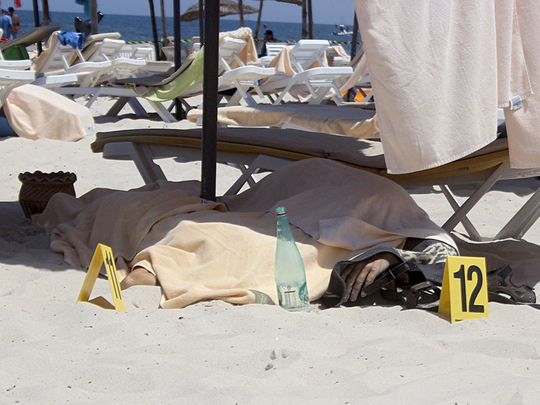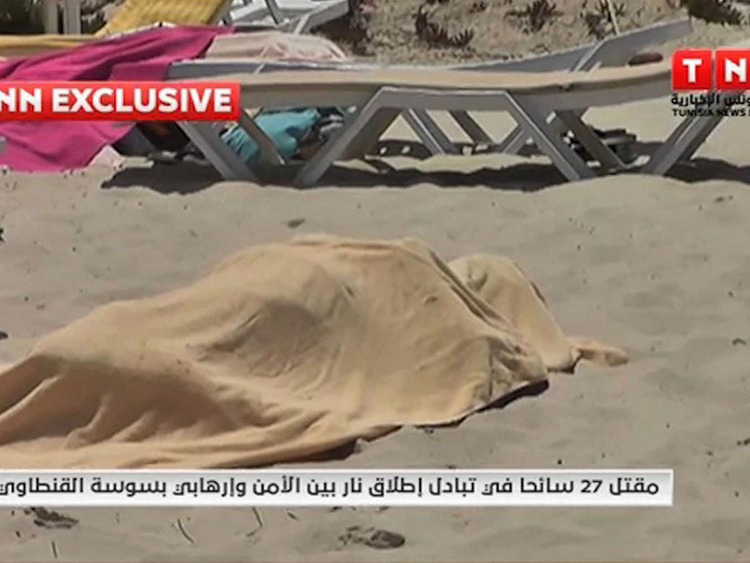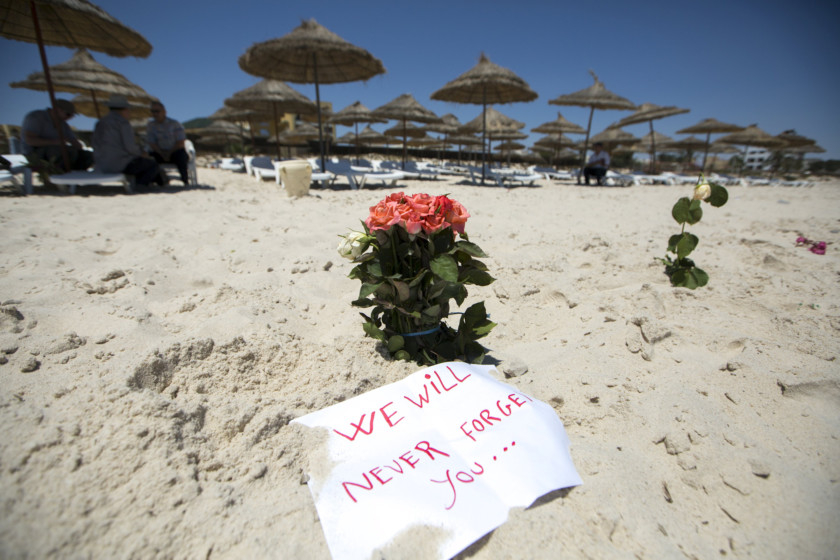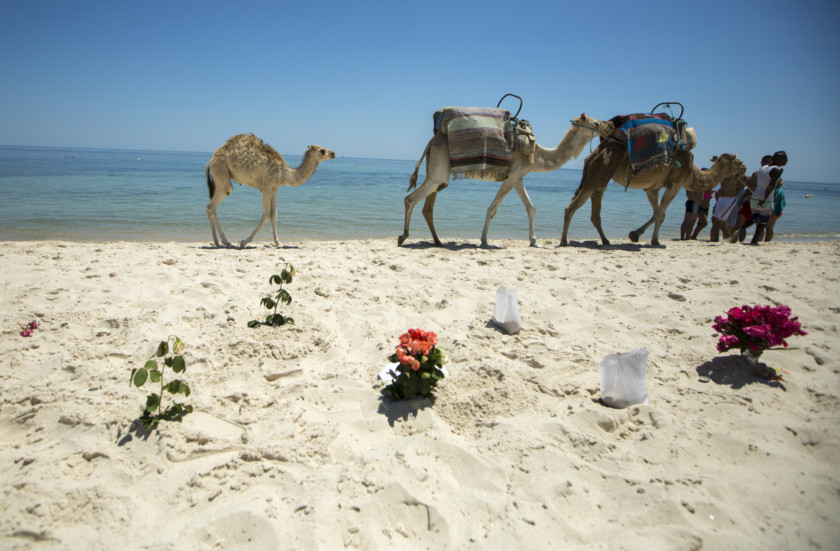
London/El Kantaoui: Owen Richards just kept running. Around him bodies fell to the ground as the lone gunman took aim and fired at the tourists on the crowded beach.
The 16-year-old was hit in the shoulder, the bullet grazing his flesh on its way into the skull of the adult stood beside him.
Owen’s uncle and half-brother also died in the onslaught.
Owen’s terrifying ordeal was relayed on Saturday by the medical team who treated the teenager at a clinic in Sousse, a five-minute drive from the El Kantaoui resort, an area dominated by four and five star hotels and miles of pristine white sand.
Other astonishing tales of heroics and of fortune were also disclosed as Britain and the world came to terms with the massacre.
The El Kantaoui beach had been crowded with sunseekers. So too the Imperial Marhaba hotel’s large pool area and the other hotels around it, the Bellevue Hotel, the Royal Kenz Hotel and the Palm Marina Hotel. Just before noon on Friday that calm was shattered; all hell would break loose.
Nobody seems to have noticed Saif Al Deen Rezgui, 23, a Tunisian student, who had wandered on to the beach, wearing black T-shirt and shorts.
He was clean shaven and dressed like a Western tourist.
In the confusion, some reports suggested he had arrived by boat; others that he had turned up on a jet ski.
Whatever the reality, Rezgui had strolled along the sand, nobody noticing the Kalashnikov assault rifle concealed inside a parasol.
Reports suggest that Rezgui first shot at a paraglider hovering above the Mediterranean.
He then turned his Kalashnikov on the sunbathers.
Owen was on the beach with close relatives when Rezgui opened fire.
He was so close to the gunfire that it had left him temporarily deafened in one ear.
The bullet that grazed his shoulder, left him with a flesh wound.
“He was shocked. He was talking about a bullet coming over his shoulder,” said Dr Fakher Benamor, a 54-year-old gynaecologist who was pressed into emergency work helping the wounded at a private clinic.
The doctor said the bullet then hit a close relative.
As Owen fled the slaughter on the beach, he saw guests dropping around him in a hail of bullets.
He told doctors that, after the initial burst of gunfire, the beachgoers stampeded in panic and began running back towards the hotel.
Benamor said: “They were running away. As he was running, he looked back and saw people being shot behind him. People were shouting ‘Go! Go! Go!’ and they were just falling.”
Mohammad Majmaji, chief nurse at the Clinique les Oliviers, said he found Owen at the scene when he was sent to collect victims by ambulance.
The teenager was distraught but still able to help another guest who was wounded.
“He was helping the injured woman who had been shot in the back. He was crying,” said Majmaji.
The clinic was also treating Matthew James for life-threatening stomach injuries.
James, 30, from Cardiff, had been sunbathing on the beach with his fiancee Saera Wilson, 26, when they came under attack.
James used his own body as a human shield to protect Wilson.
“He took a bullet for me. I owe him my life because he threw himself in front of me when the shooting started,” she said,
“He was covered in blood from the shots but he just told me to run away.
“He told me: ‘I love you babe. But just go — tell our children that their daddy loves them.”
Others on the beach had fortunate escapes.
Rita Williams, 76, was one of those.
A bullet tore through her pink straw sun hat and narrowly missed her head.
“I’ve been so lucky — I’m still shaking. It was all so frightening,” Williams, of Maesteg, South Wales, said.
She and her husband Ken were on the way back to their hotel next door to the Imperial Marhaba when the shooting began.
“We were walking back along the beach back to our hotel when we heard what sounded like fire crackers. Then I felt something hit my head — it just felt like I had been hit,” she said,
“The force of it knocked me down on to the sand and I said to Ken, ‘I think I’ve been hit’.”
They followed a crowd of tourists to a neighbouring hotel and hid in the lobby for two hours.
Williams said: “It was like a war zone, we didn’t know where the shots were coming from.
“It makes you appreciate life. I came so close to a terrible situation. I was shaken for a long time.”
Ellie Makin, 22, a former British tennis tour player, who was on holiday with her friend Debbie Horsfall, was another counting her blessings. She was close by when Rezgui pulled his gun from under his parasol.
“All of a sudden he dropped the umbrella and had a gun, and he started shooting everyone to the right of me,” said Makin.
Christopher and Paula Emery and their family also got lucky.
They ran into the water, away from the gunman, before jumping into two speed boats that were passing by.
Some tourists had no idea what was happening.
One holidaymaker said later she thought a tsunami must have been approaching to explain the rush from the sea.
With bodies falling, Rezgui marched on.
“He was laughing and joking around, like a normal guy,” said a Tunisian witness.
“He was choosing who to shoot. Some people he was saying to them, ‘you go away’. He was choosing tourists, British, French. As the tourists fled, Rezgui went after them, entering the grounds of the Rui Imperial Marhaba Hotel, reaching first the crowded figure of eight swimming pool. By the pool was Tony Callaghan, 63, from North Walsham, Norfolk, who works for Norfolk police. He realised that the sound coming from the beach was gunfire not firecrackers. His actions probably saved a number of lives.
“I used to be in the Royal Air Force,” said Callaghan,
“I know the sound of gunfire. I shouted to everyone, ‘this isn’t a fireworks display, you need to get yourself to safety now’.”
Callaghan made a run for it, passing four bodies covered in blood as he did so.
He could hear his wife Christine screaming for help from inside the hotel’s reception area.
The couple and another 20 guests scurried towards the rear of the hotel, breaking into offices to take cover.
The gunman appears to have followed them. Mrs Callaghan said: “As I ran, I was shot, although I didn’t know I had been. I wasn’t in pain, just total shock.
“I had been clutching my beach bag in front of me, against my middle, and inside were my glasses in a hard case. The bullet must have ricocheted off the glasses case, otherwise it would have hit my stomach. “I’m just lucky to be alive. If it hadn’t been for my glasses, I might not have survived.”
The firing was incessant; the level of fear hard to comprehend.
Piecing together the events of Friday, it appears Tom Richards, a 22-year-old civil engineering graduate, and his mother Sam were also in the party of 20 or so tourists trapped by Rezgui in the hotel’s back offices along with the Callaghans.
They too had been at the pool when they heard the shots, and ran for their lives.
Hotel staff ushered them from the open space of the reception area, upstairs to the offices. But the gunman followed them up to the first and then second floor.
“He shot two people through the head,” said Richards, who then found himself face to face with the killer, who was pointing the Kalashnikov assault rifle at him.
“He looked right at me — I thought I was dead,” said Richards.
“He was maybe 20 or 25, he had long black hair.”
At that point, Rezgui fired, sending bullets seemingly in all directions.
Richards and his mother were wounded by shrapnel from the marble floor as it disintegrated.
Richards was hit in the wrist; his mother in the ankle.
“I don’t know why he stopped. He could have killed everybody,” said Richards, from Cheshire.
The pair dashed to a toilet and locked themselves in a cubicle, using toilet roll as makeshift bandages.
A young woman in the cubicle next door was covered in blood, a large fragment of marble stuck in her thigh.
Richards removed the marble and bandaged the woman’s leg.
They remained in the cubicle for an hour, until rescued by the Tunisian military.
Other hotel holidaymakers had dashed for their rooms, barricading themselves in.
Ross Thompson and his girlfriend Rebecca Smith, from Coventry, both suffered shrapnel wounds.
“We managed to get the room barricaded, got down low and just hid,” said Thompson. Smith, 22, said: “I was peppered with grenade shrapnel. With one hit, I thought my jaw had come off.”
Thompson, a fire safety officer, said: “We followed the majority of people to the second floor. Staff were saying ‘come this way’, But when we got to the end of a corridor it was a dead end. There was no way down but a 30ft drop.”
He added: “We managed to get into a room and barricaded the door. It happened that there were two British ex-military guys with us and they were telling us what to do. It felt like we were in there 45 minutes. “Then we could hear him coming up the stairs. He started firing down the corridor. We tried to escape but he caught us.
“There was no way out, we were trapped at the end of the corridor, and then he started lobbing these home-made bombs at us.”
Shaky video images and still photographs show running gun battles with Tunisian special forces. A subsequent image showed Rezgui lying flat on his face, in black T-shirt and shorts, in a pool of blood.
Questions were being asked as to how the lone gunman had been able to kill so many people so quickly while unchallenged.
Tunisia had already suffered a terrible terror attack at the Bardo Museum in Tunis in March.
Saturday the beach at El Kantaoui was empty apart from the odd tourist, including Briton Alan Pembroke, returning to the scene to reflect on what had happened.
A young blonde woman in a white bikini walked alone through the now cleaned-up stretch of sand where Saturday the bodies had been strewn.
One by one, she placed red and white roses in a floral tribute on an overturned sun lounger with a handwritten message in English and German that simply read “Why? Warum?”
Meanwhile Wael, a Tunisian boat organiser who had watched in horror as the gunman opened fire, told how he had helped Britons into speed boats. “We had to save people,” he said. His colleague Hassan had grabbed four British guests who were swimming in the sea — three women and a man with a wounded shoulder — and helped them to safety in his boat. Ordinary Tunisians queued to give blood to show they too wanted to help. Amdi, a friend of Hassan and Wael and who also works in the tourism industry, chipped in. “Please tell people that we Tunisians helped the tourists,” he told The Sunday Telegraph. “ We like Europeans. This was just one crazy man.”















